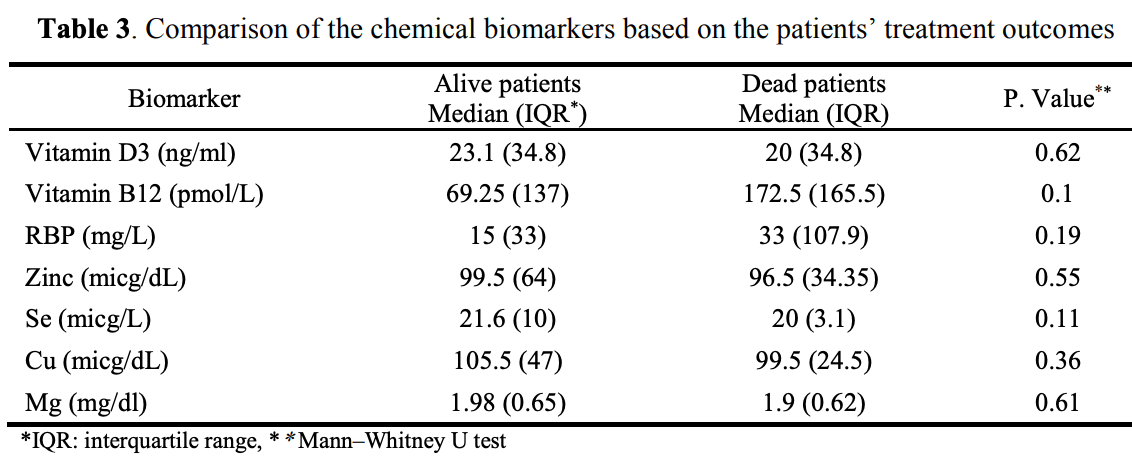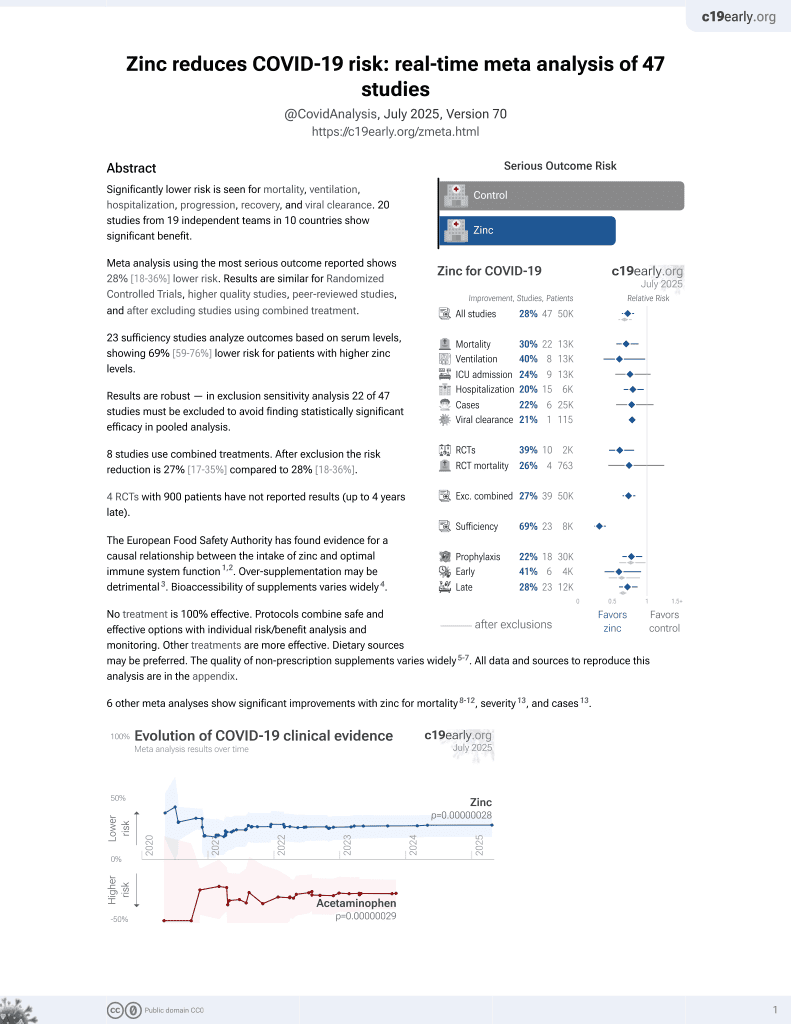
Assessment of Vitamin D, Vitamin B12, Retinol-binding Protein (RBP), Zinc, Selenium, Copper and Magnesium in Iranian COVID-19 Patients and Their Relationships with the Disease Linked Death
et al., Nutrition and Food Sciences Research, 9:2, Jun 2022
Zinc for COVID-19
2nd treatment shown to reduce risk in
July 2020, now with p = 0.00000028 from 47 studies, recognized in 23 countries.
No treatment is 100% effective. Protocols
combine treatments.
6,400+ studies for
210+ treatments. c19early.org
|
Analysis of 98 hospitalized COVID-19 patients showing that a high proportion of patients had nutrient deficiencies: 59% for vitamin D, 12% for vitamin B12, 53% for RBP, 31% for zinc, 89% for selenium, 16% for copper, and 27% for magnesium. There were no significant associations between levels and mortality. The small sample size may have prevented detection of significant associations.
Borzouei et al., 30 Jun 2022, peer-reviewed, 6 authors.
Assessment of Vitamin D, Vitamin B12, Retinol-binding Protein (RBP), Zinc, Selenium, Copper and Magnesium in Iranian COVID-19 Patients and Their Relationships with the Disease Linked Death
Background and Objectives: Clinical evidence on the nutritional statuses of COVID-19 patients and their associations with COVID-19 clinical outcomes are limited. To the best of the authors' knowledge, no studies have been carried out on COVID-19 patients of Iranian population. Therefore, the aim of this study was to assess vitamin D, vitamin B12, RBP, zinc, selenium, copper and magnesium levels in patients with COVID-19. Furthermore, associations of nutrient levels with the disease-linked death were investigated.
Materials and Methods: This cross-sectional study was carried out in hospitals affiliated to Hamadan University of Medical Sciences, Hamadan, Iran, on 98 COVID-19 positive patients, March to May 2020. Demographic and clinical data of the patients were collected from their clinical records. Blood samples of 5 ml were collected from the patients, which were used for hospital routine laboratory assays as well as measuring trace elements and vitamins. Comparison of chemical biomarkers based on the patient's treatment outcomes was carried out using Mann-Whitney U test. For data analysis, Stata Software v.14 was used.
Results: From 98 COVID-19 positive patients, 16 (13.33%) patients died during the treatment. These patients had higher proportions of heart diseases (37.5% against 10.98%, p = 0.007). Moreover, the median of white blood cell counts was significantly higher in patients, who died during treatment (p = 0.002). For vitamin D3, vitamin B12, RBP, zinc, selenium, cupper and magnesium, 59.2, 12.24, 53.08, 30.61, 88.71, 16.33 and 26.53% of the patients had values below the reference value ranges of these elements, respectively. Comparison of chemical biomarkers based on the patient's treatment outcomes did not show significant differences (p > 0.05).
Conclusions: Although results of this study did not show significant differences between the levels of the trace elements and vitamins with the outcomes in COVID-19 patients due to the small sample size of the present study, assessment of these relationships needs stronger evidence by designing large studies.
Financial disclosure The authors declared no financial interest.
Funding/Support Hamadan University of Medical Sciences financially supported this study. This funding source included no roles in analysis and interpretation of data, writing of the manuscript and decision to submit the manuscript for publication.
References
Andres, Dali-Youcef, Cobalamin (vitamin B12) malabsorption, Molecular Nutrition
Broome, Mcardle, Kyle, Andrews, Lowe et al., An increase in selenium intake improves immune function and poliovirus handling in adults with marginal selenium status, The American journal of clinical nutrition
Butler, Barrientos, The impact of nutrition on COVID-19 susceptibility and long-term consequences, Brain, Behavior and Immunity
Cannell, Vieth, Umhau, Holick, Grant et al., Epidemic influenza and vitamin D, Epidemiology & Infection
Chen, Zhou, Dong, Qu, Gong et al., Epidemiological and clinical characteristics of 99 cases of 2019 novel coronavirus pneumonia in Wuhan, China: a descriptive study, The Lancet
Coussens, The role of UV radiation and vitamin D in the seasonality and outcomes of infectious disease, Photochemical & Photobiological Sciences
D'amico, Baumgart, Danese, Peyrin-Biroulet, Diarrhea during COVID-19 infection: pathogenesis, epidemiology, prevention and management, Clinical Gastroenterology and Hepatology
Fedele, Francesco, Riso, Collo, Obesity, malnutrition and trace element deficiency in the coronavirus disease (COVID-19) pandemic: An overview, Nutrition
Gombart, Pierre, Maggini, A review of micronutrients and the immune system-working in harmony to reduce the risk of infection, Nutrients
Grant, Lahore, Mcdonnell, Baggerly, French et al., Evidence that vitamin D supplementation could reduce risk of influenza and COVID-19 infections and deaths, Nutrients
Guillin, Vindry, Ohlmann, Chavatte, Selenium, selenoproteins and viral infection, Nutrients
Iddir, Brito, Dingeo, Del Campo, Samouda et al., Strengthening the Immune System and Reducing Inflammation and Oxidative Stress through Diet and Nutrition: Considerations during the COVID-19 Crisis, Nutrients
Im, Je, Baek, Chung, Kwon et al., Nutritional status of patients with COVID-19, International Journal of Infectious Diseases
Iovino, Mazziotta, Carulli, Guerrini, Morganti et al., High-dose zinc oral supplementation after stem cell transplantation causes an increase of TRECs and CD4+ naive lymphocytes and prevents TTV reactivation, Leukemia research
Ivory, Prieto, Spinks, Armah, Goldson et al., Selenium supplementation has beneficial and detrimental effects on immunity to influenza vaccine in older adults, Clinical Nutrition
Jayawardena, Sooriyaarachchi, Chourdakis, Jeewandara, Ranasinghe, Enhancing immunity in viral infections, with special emphasis on COVID-19: A review, Diabetes & Metabolic Syndrome: Clinical Research & Reviews
Kandeel, Al-Nazawi, Virtual screening and repurposing of FDA approved drugs against COVID-19 main protease, Life sciences
Lang, Aspinall, Vitamin D status and the host resistance to infections: what it is currently (not) understood, Clinical therapeutics
Martineau, Jolliffe, Hooper, Greenberg, Aloia et al., Vitamin D supplementation to prevent acute respiratory tract infections: systematic review and metaanalysis of individual participant data
Narayanan, Nair, Vitamin B12 may inhibit RNAdependent-RNA polymerase activity of nsp12 from the SARS-CoV-2 Virus, Preprints
Patel, Penkert, Jones, Sealy, Surman et al., Baseline serum vitamin A and D levels determine benefit of oral vitamin A&D supplements to humoral immune responses following pediatric influenza vaccination, Viruses
Ragan, Hartson, Pidcoke, Bowen, Goodrich, Pathogen reduction of SARS-CoV-2 virus in plasma and whole blood using riboflavin and UV light, Plos one
Raha, Mallick, Basak, Duttaroy, Is copper beneficial for COVID-19 patients?, Medical Hypotheses
Rahman, Idid, Can Zn Be a Critical Element in COVID-19 Treatment?, Biological Trace Element Research
Razzaque, COVID-19 Pandemic: Can Maintaining Optimal Zinc Balance Enhance Host Resistance
Re, The role of season in the epidemiology of influenza, Epidemiology & Infection
Richardson, Lovegrove, Nutritional status of micronutrients as a possible and modifiable risk factor for COVID-19: a UK perspective, British Journal of Nutrition
Rizzo, Laganà, A review of vitamin B12, Molecular Nutrition
Roser, Ritchie, Ortiz-Ospina, Hasell, Coronavirus pandemic (COVID-19), Our World in Data
Saigal, Hanekom, Does zinc improve symptoms of viral upper respiratory tract infection? Evidence-Based Practice
Schnettler, Ahwel, Suhag, Severe acute respiratory distress syndrome in coronavirus disease 2019infected pregnancy: obstetric and intensive care considerations, American journal of obstetrics & gynecology MFM
Sohrabi, Alsafi, Neill, Khan, Kerwan et al., World Health Organization declares global emergency: A review of the 2019 novel coronavirus (COVID-19), International Journal of Surgery
Stipp, SARS-CoV-2: Micronutrient Optimization in Supporting Host Immunocompetence, International Journal of Clinical Case Reports and Reviews
Taheri, Bahrami, Habibi, Nouri, A Review on the Serum Electrolytes and Trace Elements Role in the Pathophysiology of COVID-19, Biological trace element research
Tan, Ho, Kalimuddin, Cherng, Teh et al., A cohort study to evaluate the effect of combination Vitamin D, Magnesium and Vitamin B12 (DMB) on progression to severe outcome in older COVID-19 patients, medRxiv
Wintergerst, Maggini, Hornig, Contribution of selected vitamins and trace elements to immune function, Annals of Nutrition and Metabolism
Wolffenbuttel, Wouters, Heiner-Fokkema, Der Klauw, The many faces of cobalamin (Vitamin B12) deficiency, Mayo Clinic Proceedings: Innovations, Quality & Outcomes
Yaqoob, Ageing alters the impact of nutrition on immune function, Proceedings of the Nutrition Society
Zabetakis, Lordan, Norton, Tsoupras, COVID-19: The Inflammation Link and the Role of Nutrition in Potential Mitigation, Nutrients
Zhang, Taylor, Bennett, Saad, Rayman, Association between regional selenium status and reported outcome of COVID-19 cases in China, The American Journal of Clinical Nutrition
Zhao, Li, Ge, Shi, Lv et al., Evaluation of nutrition risk and its association with mortality risk in severely and critically ill COVID-19 patients, Journal of Parenteral and Enteral Nutrition
Zhu, Zhang, Li, Yang, Song, A novel coronavirus from patients with pneumonia in China, New England Journal of Medicine
borzouei
